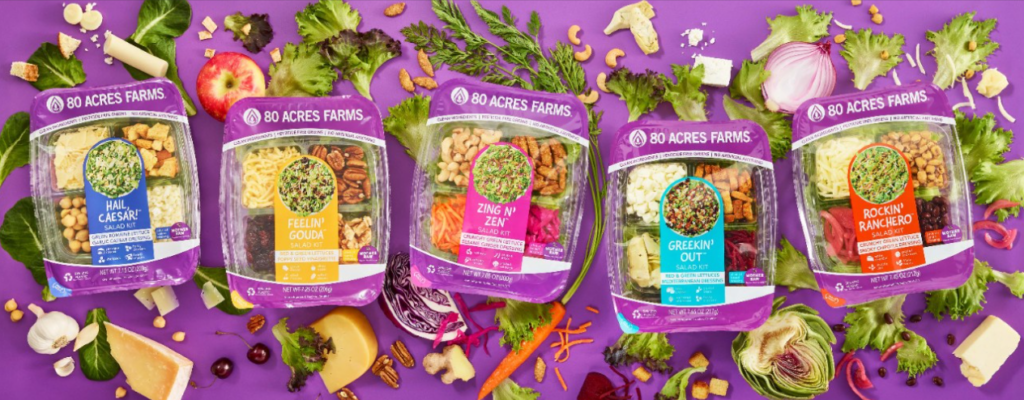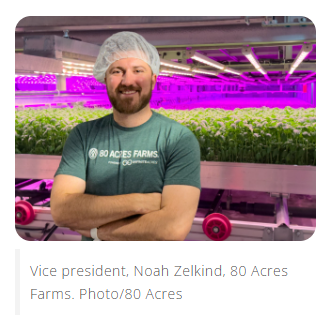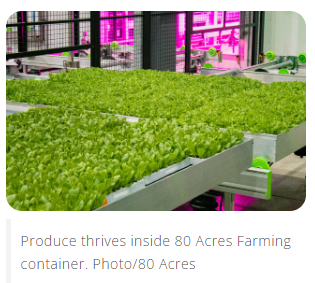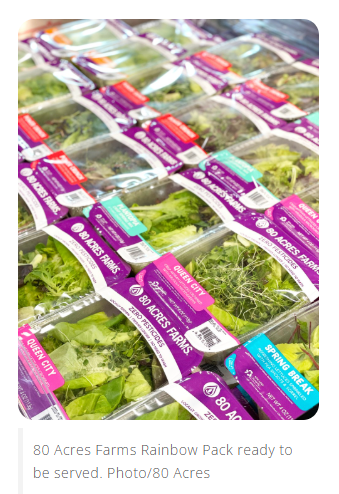80 Acres Farms cultivates the future of produce by looking upward

80 Acres Farms is reshaping the future of agriculture through its innovative indoor vertical farming system.
In 2015 by Mike Zelkind and University of Cincinnati alumna Tisha Livingston, co-founded 80 Acres Farms. It has since grown from a small research and development facility to building a brick-and-mortar farm. It kept growing from there to operating large-scale, high-tech, innovative farms producing fresh, locally grown produce year-round.
Raising over $250 million, 80 Acres has directed most funds toward enhancing its facilities and supporting local communities. Notably, $95 million was invested into its 200,000-square-foot facility situated on 22 acres in Boone County, Kentucky, further expanding the company’s reach and advancing sustainable food production.

Outgrowing the planter
80 Acres Farms began its journey inside a shipping container, as its team experimented with different farming technologies to develop efficient vertical systems. The company’s methodical approach to growth, testing and refining led to a pivotal moment when it launched its first 70,000-square-foot farm in Hamilton, Ohio.
The innovative facility is longer than a football field and includes 10 growing levels stacked on top of each other. The farm’s initial success was followed by further expansion, including the more recent Kentucky facility, which has been in operation since late 2022.
“Our goal from the start was to develop systems that could handle the stresses of population growth, farmland loss and climate change,” says Noah Zelkind, vice president of business intelligence and strategic finance for 80 Acres Farms. “We’ve learned from every farm we built, and now we’re focused on scaling up to bring fresh, healthy food to more people. It’s not just about growing food but about fitting into the community and using what’s already there.”
Leading the way with infinite tech
80 Acres Farms utilizes cutting-edge technology across three pillars: hardware, software and biology. By growing plants in controlled environments and gathering data from thousands of crop cycles, the company continually refines its approach to vertical farming. This proprietary scientific method, known as the Infinite Acres Loop system, is the nerve center of each farm.
Livingston is CEO of Infinite Acres, a wholly owned subsidiary of 80 Acres Farms dedicated to developing and managing the company’s operating systems. Infinite Acres primarily houses technology teams and is deeply integrated with 80 Acres Farms, covering all hardware, software and controls. Under Livingston’s leadership, the platform optimizes efficiency, quality and productivity, seamlessly guiding plants from seed to fresh, ready-to-eat produce.
Sustainability and impact at the roots

Sustainability is central to 80 Acres Farms’ operations. By growing food without deforestation or chemical fertilizers, the company addresses some of modern agriculture’s most pressing environmental challenges. Led by a full-time head of sustainability, the company’s efforts include reducing water consumption, minimizing waste and enhancing productivity with fewer resources.
“We’re trying to make farming as sustainable as possible, but we know there’s always more to do,” Zelkind says. “The more efficient we become, the better it is for our planet and our business.”
80 Acres Farms is not only producing food but also creating high-quality jobs. From machine operators to data analysts, the company’s year-round farming model provides careers with opportunities for advancement. Additionally, 80 Acres Farms’ produce complements local farming efforts, ensuring a steady supply of fresh, pesticide-free food throughout the year.
“We’re proud to contribute to the local economy and provide careers that offer dignity and opportunity,” Zelkind says.
Looking to the future

As 80 Acres Farms expands, its leadership team is focused on scaling operations to meet growing consumer demand while maintaining quality and sustainability. The company also sees potential to apply its technology beyond food, exploring new opportunities for plant-based products.
“Our farms function like giant laboratories utilizing technology to learn and improve continuously. We’re producing data that helps us understand plants in ways conventional farmers can’t, and that’s driving our success,” Zelkind notes. “We’ve proven that our technology works; the challenge is scaling it sustainably. We’re excited about the possibilities for the future — both in food and beyond.”
When it comes to launching or scaling a business, UC’s 1819 Innovation Hub is a crucial resource for innovation and entrepreneurship. This dedicated space supports programs like the Venture Lab, which transforms startups from concept to commercialization and aids established businesses, like 80 Acres Farms, in scaling sustainably.
Article Credit: uc